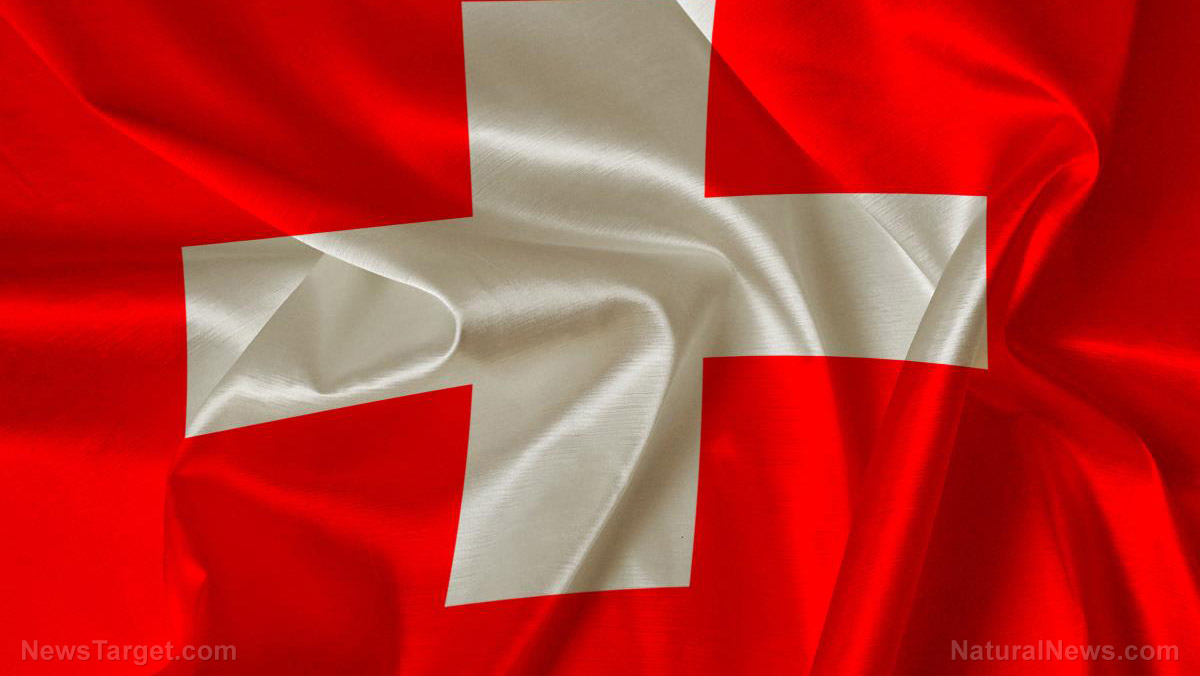EU elites promised a prosperous green future. This could be their undoing
04/22/2024 / By News Editors

Lenin famously defined communism as Soviet power plus electrification of the whole country. In other words, the ideological project of building communism was supplemented by the technocratic project of electrification, the latter being an important source of legitimacy for the new regime.
(Article by Henry Johnston republished from RT.com)
The present-day European Union is engaged in its own expansive electrification project – the energy transition – that similarly inhabits ground where ideology meets technocracy and underpins legitimacy.
Yet in the past year or so, something has gone badly wrong, and a backlash against the climate agenda and its technocratic enforcers has been spreading across Europe. The energy crisis – far from catapulting the continent further along the path toward a carbon-neutral future as it should have – has exposed just how elusive the goal is, as Europe has scrambled to sign expensive LNG deals and even restart coal-fired plants. Farmers dissatisfied with EU policies that they regard as devastating to their livelihoods have been grumbling for years, but recently their protests have reached a crescendo, and built up political weight. Right-leaning and far-right parties, meanwhile, are gaining ground by the day. Standards of living are dropping and industry is shutting down or moving elsewhere.
Discontent with suffocating bureaucracy and regulation is widespread. A recent survey among German small and medium-sized companies – has registered a massive shift in sentiment against the EU. This is particularly concerning because the so-called German Mittelstand used to be among the strongest pillars of support for European integration.
What is embroiling Europe is deeper than a political crisis – it is approaching what can be called a crisis of legitimacy for the ruling elite. This can be thought of as a metaphysical event that precedes political upheaval, the latter being merely confirmation that such a crisis has taken place. Legitimacy is, of course, a rather nebulous concept, and it defies objective measurement.
Ruling classes throughout history have always advanced various claims about their own legitimacy, without which a stable political order is impossible. In tracing the contours of the current crisis, it’s important to establish what exactly the claims Europe’s technocratic elite have put forth and how they are becoming increasingly difficult to believe.
Ostensibly, the EU’s ruling elite has staked out the green transition as its raison d’être. They claim to have the mandate, vision and competence to see it through and have set clear targets to measure their success.
The headline targets and dates are well-known: reduce greenhouse gas emissions by 55% by 2030 and become climate-neutral by 2050. There are many other secondary targets. But the goals themselves, which will almost certainly prove elusive, are actually not where Europe’s technocracy has staked its credibility, and the failure to achieve them will not prove its undoing. What is in fact being promised in the energy transition lies somewhere adjacent to the carbon reductions and phase-out of fossil fuels. It is a vision of growth and prosperity wrapped up in a deeper narrative imbued with quasi-religious meaning, and a technocratic path toward achieving it. It is partly a promise of prosperity itself, partly a story about that prosperity, and partly a belief in the power of the anointed managerial class to achieve it.
The EU Green Deal is an ambitious and far-reaching program that can be parsed at many levels. It will certainly go down as a cultural artifact of our era. What is underappreciated, however, is the extent to which it has hitched its wagon to those very notions of growth and prosperity, albeit, of course, with a shiny green luster. In the discourse surrounding the initiative, words such as “emissions” and “renewables” are interspersed with ideas about a “prosperous society,” a “competitive economy,” and a “jobs bonanza.” When launching the Green Deal, European Commission President Ursula von der Leyen called the program “our new growth strategy – a strategy for growth that gives more back than it takes away.”
The Commission’s press release announcing the Green Deal – tantamount to a statement of creed – makes a startling juxtaposition. Climate change and environmental degradation, we are told, “present an existential threat to Europe and the world.” A more stark description of an apocalyptic crisis cannot be formulated. But the solution, which is couched in the typical corporate jargon of our era, makes clear what the vision is really about: “to overcome this challenge” – it’s merely a challenge now – “Europe needs a new growth strategy that transforms the Union into a modern, resource-efficient and competitive economy… where economic growth is decoupled from resource use and where no one and no place is left behind.” This is the future that Europe’s technocratic class has promised, and it will live and die by this promise.
In other words, climate targets are set and inevitably missed, but the prospect of missing them hardly threatens the legitimacy of the EU technocracy: if anything, the EU has been quite transparent about falling short of targets, because this only means that efforts need to be redoubled, regulations tightened, and more resources devoted to the cause. The most recent monitoring report by the European Environmental Agency readily admits that the majority of the 2030 green objectives will likely be missed.
But it’s a very different story when the EU becomes not more modern but less, as innovation falls behind. And instead of becoming more resource-efficient, it begins drastically overpaying for the same non-green energy sources and even returning to coal. Or when the economy loses rather than gains competitiveness and many companies simply pack up shop and move abroad. And what happens when Europe itself is left behind?
One of the implications of the green transition essentially being envisioned as a preservation of the current economic system but plopped down onto a new, sustainable foundation is that all the current rules must still apply: those governing investment, economic viability, and profit. As much of some on the fringe of the climate movement may yearn to implement a system-demolishing ‘eco-Leninism’, to use a term coined by radical activist Andreas Malm, the official EU narrative firmly inhabits the neoliberal framework.
And this leads us to the next great conceit of the energy transition: that there is no trade-off between green investing and making money and that much of the green transition would be quite profitably financed by the private sector. As money poured into green projects, the thinking went, those companies would surge ahead, leaving their non-green counterparts languishing and starved of capital.
And in fact, a strong emphasis has been placed on tapping the deep-pocketed world of institutional managed money. According to the EU’s own estimates, around €400 billion will be needed each year from 2021 to 2030 and €520-575 billion per year in the subsequent decades until 2050. Since the EU cannot pony up anywhere close to that amount, the idea has been to lean heavily on the private and financial sector, with public funds directed to making projects profitable for investors.
For a while, it seemed things might in fact be moving in the direction of a merger of green policy and capitalist profits. When Ford launched an electric Mustang and pickup truck, its market value surged to over $100 billion for the first time. A portfolio put together by The Economist in mid-2021 featuring stocks that stood to benefit from the energy transition doubled the returns of the S&P 500 over a period of a year and a half. Previously the domain of niche sustainable funds, green stocks broke out into the wider market and began receiving inflows from conventional funds. Investors inevitably began drawing comparisons between clean energy today and tech at the turn of the millennium in its market-altering potential.
Meanwhile, various green special-purpose acquisition vehicles (SPACs) proliferated. SPACS are a novel way for smaller companies to list without having to make an initial public offering, although they are indelibly associated with the now-departed era of low interest rates and abundant and cheap capital, when investors were looking to gain exposure to as many small prospective companies as possible in the hopes of hitting the jackpot with the next Tesla. Meanwhile, companies fully reliant on government subsidies with unproven technology were raising money.
A sense emerged that practically any well-marketed endeavor in tune with the prevailing zeitgeist could raise capital, and trendy political ones all the more so. In fact, the implicit unspoken expectation was that in the low-interest-rate world, enterprises supported by the Western elite were, perhaps not sure bets, but at least more attractive than they otherwise might be.
Alas, this world was not meant to last. Surging inflation and the sharp rise in interest rates to fight it in tandem with the energy crisis in 2022 blew a cold and menacing wind through the green investment boom and revealed much of it to be a fad. The S&P Global Clean Energy Index fell more than 20% in 2023. ESG funds in the US bled more than a net $5 billion in the final three months of 2023, while Europe saw a huge decline in the pace of inflows. Danish offshore wind developer Orsted, one of the darlings in the renewable space, canceled two US projects and has seen its share price plummet 75% since its 2021 highs. After declining for several years, the cost of wind and solar began rising.
Perhaps most symbolic is that Climate Action 100+, the world’s largest investor engagement initiative on climate change, has recently seen a spate of high-level desertions. In just a few days JPMorgan Asset Management, State Street and Pimco withdrew, while BlackRock moved its membership to its much smaller international business in what is a clear downgrade.
Many reasons are cited for the moves but what BlackRock attributed its decision to is probably closest to the truth: the potential conflict between the aim of Climate Action 100+ to get companies to decarbonize and its own fiduciary duty to customers to prioritize returns. In other words, the green economy and making money aren’t quite so compatible after all.
The last year or so has laid bare the reality that the energy transition will not be propelled by a wave of private investment. That puts the onus squarely on policymakers, who will have to mandate the necessary measures rather than hoping that the market delivers them on its own accord. And indeed, what we have seen is that EU institutions and European governments have used executive-heavy measures to push through climate policies, tempered by sporadic and reluctant concessions to farmers and other constituents. In this sense, the EU technocracy has indulged its worst impulses: a penchant for intricate and all-encompassing regulation and classification that almost seems to be a green reincarnation of the mind-boggling complexity of late medieval Scholasticism that set out to codify and order every aspect of the world in accordance with Christian theology.
And here we circle back to the question of legitimacy. Reality has come to resemble almost the mirror opposite of what the European Commission’s “new growth strategy” prescribes. The continent is deindustrializing and plunging headlong into a deep economic decline, yet Europe’s ruling class has staked its legitimacy on the exact opposite: a potent vision of prosperity.
Quite telling is that in 2023, Germany’s carbon emissions fell by a whopping 10% in just one year. For those convinced of the “existential threat to Europe and the world” of climate change, this figure should have been celebrated, regardless of how it was achieved. But because the reduction came thanks not to steps toward a “modern and competitive economy” but quite the opposite – factories shutting down – it was met not with jubilation but embarrassment. This is not how carbon reductions were supposed to happen, and it is why Europe’s ruling elite is facing a deeper crisis.
Regimes whose legitimacy has been compromised but which nevertheless plough ahead with unpopular measures and intrusive regulations enter a very dangerous place. Veteran European analyst Wolfgang Munchau believes that the hyperactive phase of the green agenda will end with the European elections in June and that some of it might even go into reverse. This may be true and if so it would be a prudent political compromise that could stave off a more acute crisis. But it would represent a profound retreat, and it will not restore the lost legitimacy.
Read more at: RT.com
Submit a correction >>
Tagged Under:
awakening, big government, bubble, Climate, Collapse, deception, deep state, economic riot, Europe, European Union, finance riot, globalists, green living, Green New Deal, green tyranny, insanity, lies, market crash, money supply, outrage, propaganda, risk, technocrats, Xpost
This article may contain statements that reflect the opinion of the author



















